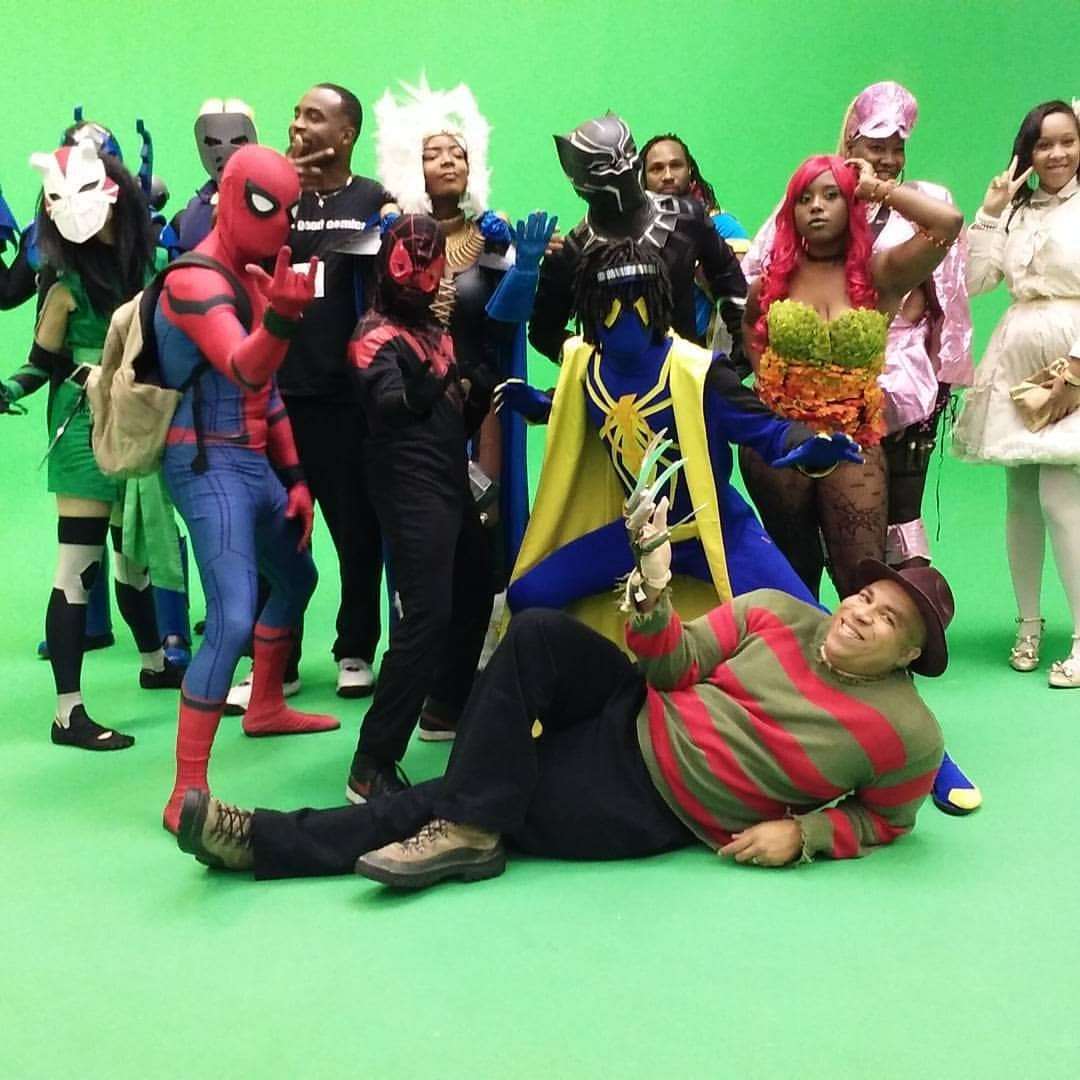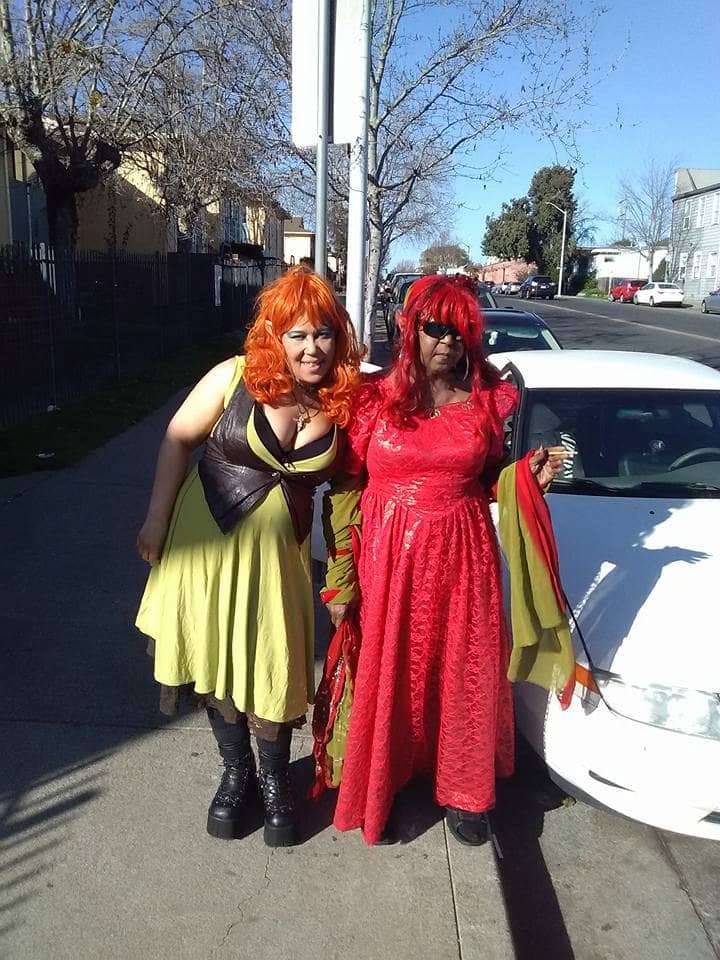
What if what you write is comic books? Comic book conventions, zine and comic book festivals, and independent press expos are the scene for up and coming comic book writers and illustrators.
Writing While Black: February 2020 Edition
by Sumiko Saulson
One of the Bay Area’s most entertaining new Black convention offerings is AfroComicCon, which injects a healthy dose of Black culture into the family-friendly comic book convention. Comic book conventions are places where you can go to buy comic books and related gear, but they are not stuffy and academic. They are fun, all-ages enticing, and feature family fun entertainment that makes them especially attractive to teens, the young at heart, and people with young children.
Some of them include photo opportunities with people dressed as your favorite comic book superhero, or the actors who play them in movies or on television. AfroComicCon is a program of Oakland Technology & Education Center, a 501c3 non-profit organization. It was originally conceived of by Michael James.

“I noticed that there was a lack of representation of people of color in comic books. The youth that I worked with in my afterschool program had a love and passion for comic books, graphic novels and the nerd culture which was not available in their communities, and when I took them where it was available, there was a lack of characters and even attendees that looked like them.
“This is something I’d thought about in one way or another for years but one of the galvanizing moments for me was when Jada Pickett Smith announced that she was boycotting the Oscars due to the lack of representation in the Oscar nominees for 2016. She said, “We have to make our own” – and I listened!
“Long before that, I noticed the lack of diversity at cons and how when I took my students from our educational program to visit a con, they were sometimes disappointed when they didn’t see any superhero images that looked like them,” said James, co-founder of AfroComicCon.
I first met Michael James and Hally Bellah-Guther, co-founders of AfroComicCon, two years ago in February 2018 at East Bay Comic Con in Concord, where they had a booth. AfroComicCon, which takes place in Emeryville or Oakland every October, was less than six months old at the time, having finished its first year in October of 2017. Michael, a tall, reserved African American fellow, manned the booth while his partner, Hally, a spritely and energetic young white woman, excitedly approached my mother and me.

“AfroComicCon has everything a ‘regular’ comic con has, but it is different because we have more meat! Here are some examples: Panel discussions, workshops and presentations around varied topics relating to comics, production, Afrofuturism, film and TV, gaming, fashion, art, legal help for artists, entrepreneurship, social justice and more, focusing on culture and social impact for marginalized groups,” explained Michael and Hally, co-founders of AfroComicCon
The 2018 East Bay Comic Con was particularly memorable to me because it was the first major event of the last year me and my mom spent together. A year later, she would be gone after a nine and a half year battle with multiple-myeloma, a cancer in the leukemia and lymphoma family that predominantly affects African Americans. I went to the bathroom and when I came out, Mom was excitedly beckoning for me to come meet the people from AfroComicCon. They were looking for presenters, she said. She introduced me to the team as a sci-fi and horror author.
“For a relatively small con, we have a lot of programming and also many fun interactive activities like live printing, top of the line video game playing, playing new independent game developers’ creations, VR, FLASH (Fit Like A Super Hero) dance and martial arts workshops, a cosplay fashion show and costume contest,” said Michael and Hally.
Cosplay or “costume play” is dressing up as your favorite television, movie or comic book character. Chocolate Colored Cosplay is Afrocentric cosplay, and appreciation for dark skinned cosplayers like my mother is a central tenet of the Chocolate Colored Cosplay movement.
As it turned out, Hally and Michael were scouting East Bay Comic Con for Black cosplayers, and were attracted by my beautiful mahogany mother’s gorgeous costume. We were there dressed as Leetah and Ember from ElfQuest, a mother and daughter duo.

Leetah is a Black-appearing alien elf who is the wife of the main character, Cutter. Ember and her twin brother are their children. The creator Wendy Pini has stated the dark skinned elf from the world with two moons is intentionally racially ambiguous because she isn’t human or from Earth. However, the artist modeled her tribe’s features, clothing and customs after North African, Middle Eastern and Southeast Asian human beings, making her a popular choice for Black cosplayers.
The movie “Black Panther” had just come out, and we were all very excited about it. Mom chatted with the pair about how she intended to dress up as Queen Ramonda from “Black Panther” at her next convention. This plan was put on hold so Mom could join me in promoting my comic, Mauskaveli.
We were there to meet a semi-professional cosplayer named Tom Kiryu and his mother, who frequently cosplays with him. Tom is known for his abdominal muscles and sexy cosplays. He is also known for yaoi cosplays and modeling. Yaoi is same sex male-on-male adult Japanese culture inspired comic book culture.
I was talking to him about modeling stuffed animals and clothing for my comic book clothes line Mauskaveli. He agreed to do it, and my mom and I spent a lot of time at different comic conventions that year promoting my comic. Mom, being a good Mom, dressed up as one of my comic book characters, Petricio, at all of these.
“AfroComicCon™ entertains, educates and unites a diverse, global audience around comics, art media, technology and culture. We establish a platform to showcase and empower artists who have historically been denied access to equal opportunity. It is different in a few ways – more educational and networking opportunities for career development, a richer atmosphere of artistry and culture, as opposed to just pop culture, a feeling of being at a safe space with a very warm, loving and joyful family happening!” say Michael and Holly, the founders.
“The artist and vendor booths of every con are really the backbone of the event. They bring the beauty, skill and artistry that excites and dazzles the attendees. We encourage artists, vendors and guest speakers of color to dominate the offerings,” say hosts, Michael and Hally.
February 2018 was memorable in many ways. My mother had her 70th and final birthday party at Vik’s Karaoke in Vallejo that month. On the 15th of that month I came out with my first traditionally published book, “Black Magic Women.” I was on my way from a self-published local author and blogger to award-winning author who is respected in some circles, controversial in others. I didn’t even win my first major writing award, the Afrosurrealists Award, until later that year. There’s been a lot of life lived in that short period of time.
I had been very interested in presenting at AfroComicCon, but the timing didn’t work out because of my mother’s illness. I’ve heard great things so I would recommend vending at AfroComicCon to any up and coming Black author with a substantial number of books or items to sell. An Artist Alley Table purchase comes with two entries to the event, a table and two chairs.
“The artist and vendor booths of every con are really the backbone of the event. They bring the beauty, skill and artistry that excites and dazzles the attendees. We encourage artists, vendors and guest speakers of color to dominate the offerings,” say the hosts, Michael and Hally.
Mom died in January 2019, but we made it to 2018 BayCon, 2018 Silicon Valley Comic Con and the 2018 San Mateo County Fair before she got too sick to leave the house. We dressed as Mauskaveli and Petricio for all of those except the County Fair. By the time World Comic Con in San Jose rolled around in August 2018, mom was hospitalized, on palliative end of life care and too sick to go anywhere.
It was especially depressing because I was moderating a panel on “Black Panther” and Afrofuturism with Steven Barnes, a noted Afrofuturist and husband of Tananarive Due. It would have been the perfect opportunity for Mom to wear that Queen Ramonda costume.
AfroComicCon started out with the acronym BLAM which stands for Black, Latino, Asian, Manifested. BLAM presents: AfroComicCon! The thought was this acronym would help to let people know that they were inclusive, while AfroComicCon is Afrocentric, and it has a decidedly Afrocentric set of offerings and crowd. In true Bay Area form, it also embraces diversity and inclusion. The goal was to have a series of multicultural festivals for different marginalized groups.
“Everyone is welcome if they are providing something that aligns with our mission and vision,” say Michael and Hally.
I would love to speak at AfroComicCon, their line up and convention schedule is impressive. I haven’t so far, partially because I stopped booking events when my mother’s health declined in August 2018. By the time AfroComicCon came around in October, I was off the convention circuit.
If you would like to appear there, you can contact the organizers directly through email or on social media, or apply on the website to be a speaker or workshop holder at the yearly event. It is competitive and you may or may not be chosen. You can also rent a booth for a reasonable sum at AfroComicCon.
Bestselling author Sumiko Saulson writes award-winning multicultural sci-fi, fantasy, horror and Afrosurrealism. Winner of the 2017 Afrosurrealist Writer’s Award, 2016 HWA Scholarship from Hell, and 2016 BCC Voice Reframing the Other Award, (he)r monthly series Writing While Black follows the struggles of Black writers in the literary arts and other segments of arts and entertainment. (S)he is gender non-binary. Support (he)r on Patreon and follow (he)r on Twitter and Facebook.





